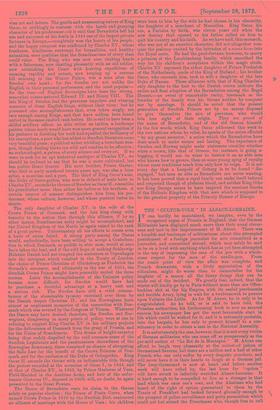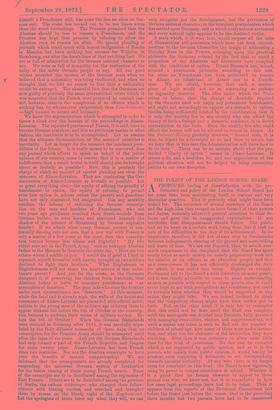THE " CULTUR-VOLK " IN ALSACE-LORRAINE.
I T can hardly be maintained, we imagine, even by the recognised organ of Prussia in England, that the German Militarists have displayed much more than their usual clever- ness and tact in the imprisonment of M. About. There was a breadth and burlesque of arbitrariness about this attempted punishment of a foreign journalist for acts committed as a journalist, and committed abroad, which may safely be said to be on a level with anything which has as yet been attempted in the way of impressing the men of the pen with a whole- some respect for the men of the needle-gun. From the comic point of view the affair was complete, and French dramatists, with a lively appreciation of the ridiculous, might do worse than to immortalise for the laughter of a season all the funny things that can be made out of the incident. We greatly fear, indeed, that the winter will hardly go by in Paris without more than one Offen- bachian skit at the big Empire, with its sealed parchments and terrible Army, lying in wait for a twelvemonth to pounce upon Voltaire the Little. As for M. About, he is only to be congratulated. As he told, or is said to have told, the Prussian authorities, his forthcoming book is now an assured success, his newspaper has got the most favourable start in life which could be wished for it, and it is extremely probable, into the bargain, he has only to present himself to a con- stituency in order to obtain a seat in the National Assembly.
It is unfortunately the case, however, that it is not every victim of German militarism who can come off as prosperously as the per-acid author of "Le Roi de la Montagne." M. About can afford to laugh very pleasantly at the maladroit jailors of Germanised Saverne, but there are a million and a half of other French who can only suffer by every despotic gaucherie, and will never have it in their hearts to laugh at a German jail. The long-threatened is now at hand, and before another week will have rolled by, the last hour for "option" will have struck in infinitely wretched Alsace-Lorraine. It is hard enough to be compelled to live as a stranger in that land which was once one's own, and the Alsatians who had heard of the right of option guaranteed to them by the Treaty of Frankfort had looked forward gloomily enough to the prospect of police surveillance and petty persecution which could not but attend the Frenchman who, though free to call
himself a Frenchman still, was none the less an alien on Ger- man soil. The event has turned out to be ten times worse than the worst forebodings. The Prussian promised that the Alsatian should be free to remain a Frenchman, and the Prussian has kept that promise by refusing to allow the Alsatian even to remain an alien. No special pleading of journals which could speak with honest indignation of Bombe in Messina, but have nothing but excuses for Wilhelm in Strasbourg, can alter the harsh lines of that revolting fact. We are as full of admiration for the German national character as any. We were as full of sympathy for the realisation of the unity of the noble German people as any. All our good wishes attended the success of the German arms when we believed that a nationality was being vindicated, and when we thought that we had no reason to fear that a nationality would be outraged. The shameful fact that the Germans are now guilty of precisely the same international crime which it was suspected that the French were prepared to commit can- not, however, remove the complexion of an offence which is nothing less, by whomsoever perpetrated, than Use-humanite, —high treason to nature and humanity.
We know the argumentation which is attempted in order to throw a cloak over the horrors of the proceedings in Alsace- Lorraine. The separated provinces of France, it is said, have to become German somehow, and it is no particular matter in what fashion the inevitable is to be accomplished. Let us assume that the ultimate Germanization of the annexed countries is inevitable. Let us forget for the moment the imminent possi- bilities of the future. Is it really meant to be conveyed, does any journal which affects to speak on behalf of the public opinion of our country mean to convey, that it is a matter of indifference that a result brutal in itself should also be brought about as brutally as possible Now, this is precisely the charge of which no amount of special pleading can clear the annexers of Alsace-Lorraine. They are conducting the Ger- manisation of Alsace-Lorraine as brutally as possible. Let us grant everything else,—the equity of affixing the penalty of banishment to option, the equity of refusing to permit even this option to minors unless the parents and guardians have not only consented, but emigrated. Can any morality condone the infamy of enforcing the German conscrip- tion on the sons and brothers of Frenchmen, who not two years ago perchance received their death-wounds from German bullets, or were burnt and shattered beneath the shadow of the minster of Strasbourg by German explosive bombs ? If we admit what every German journal is con- tinually dinning into our ears, that a new war with France is only a matter of a few years at the most, does this conscrip- tion torture become less odious and frightful ? "My two eldest sons are in the French Army," said an unhappy Alsatian father to the Marquis de Gouvello the other day, "Here are two others whom I confide to you. I would die of grief if I had to reproach myself hereafter with having brought up two soldiers destined to fight their brothers." What Englishman or Englishwoman will not share the heart-sorrow of that unfor- tunate parent ? And yet for the crime, as the Germans designate it, of preserving his children from fratricide, that Alsatian father is liable to summary punishment as "an accomplice of deserters." The poor lads who cross the frontier under such circumstances are "deserters." At this moment, while the fatal end is already nigh, the walls of the towns and communes of Alsace-Lorraine are placarded with official notifi- cations to the young men of the military age ordering them to appear without fail before the 6th of October at the conscrip- tion bureaus to undergo their terms of military service. Be- fore the 6th of October ! When the German Rhinelands were restored to Germany after 1814, it was carefully stipu- lated by the Holy Alliance monarchs of those days, that no conscription for the Prussian Army should be attempted until after the lapse of six years. And yet the German Rhinelands had only formed a part of the French Republic and Empire for some twenty years. Alsace-Lorraine has been French since two centuries. Nor are the Alsatian conscripts to have even the benefits of mutual companionship. We are informed that the arrangements are already completed for suspending the universal German system of localisation for the better taming of these young French hearts. Some of the conscripts are to be distributed among the regiments of
East Prussia. Others are to be distributed among the garrison of Berlin, the callous soldatesgue who charged their fellow- citizens with blazing torches, and scorched and trampled them by scores on the bloody night of the Zapfenstreich. Let the apologists of brute force say what they will, we can
only recognise not the development, but the perversion of German national character, in the truculent pra3torianism which has settled upon Germany, and to which every natural sentiment and every natural right appears to be the destined victim.
A story which, if it were true, would surpass all the tales of Bismarckian self-possession which have yet been current, ascribes to the German Chancellor the design of addressing a Circular Note to the Powers, enlarging upon the practical plebiscite for Germany evinced by the fact that so small a proportion of the Alsatians and Lorrainers have complied with the conditions of option. Prince Bismarck has, indeed, secured a unanimous plebiscite according to this test, for since no Frenchman has been permitted to remain in Alsace, no inhabitant of Alsace can be a French- man. We are afraid, however, that such a master- piece of logic would not be as convincing as perhaps its ingenuity deserves. The idea under which the Times seems to labour, that the change of domicile required by the Germans need not imply any permanent banishment, and ought not accordingly to oppose any obstacle to option, besides being sufficiently refuted by the consideration that it is only the wealthy few in any country who can afford the luxury of both a foreign and a domestic residence, is in direct contradiction to the facts. Even the wealthy few who could afford the luxury will not be allowed to return to Alsace. As the National Zeitung gleefully observes, "Several wish, it is true, to depart for a fortnight or so, and then to return, but we hope that in this case the Administration will know how to do its duty." There can be no mistake about what the pre- tended "liberty of option" means in Alsace-Lorraine. It means a lie, and a heartless lie, and our appreciation of the political situation will not be helped by being consenting parties to our own deception.



































 Previous page
Previous page